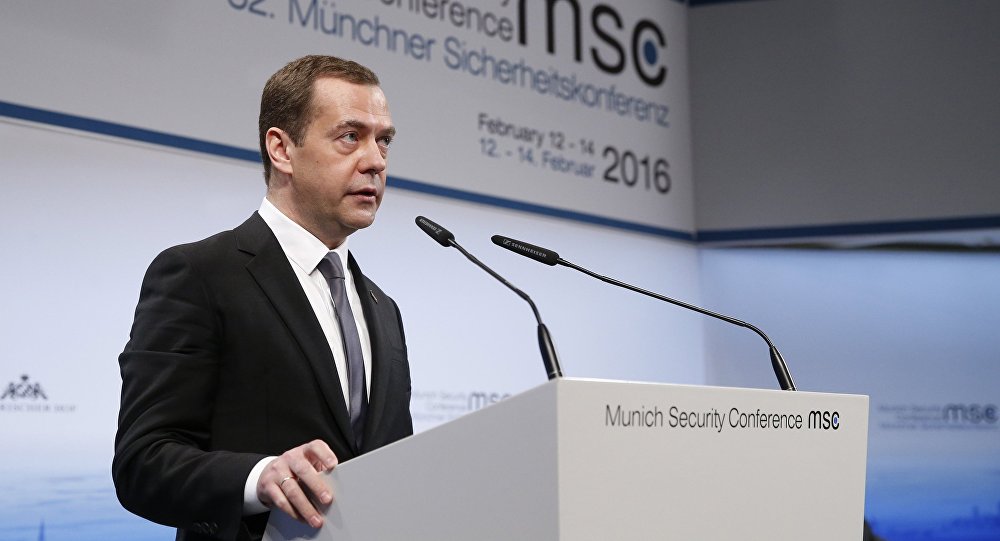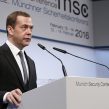
Munich Security Conference Debates Russia’s War in Ukraine (Part One)
Publication: Eurasia Daily Monitor Volume: 13 Issue: 31
By:

Russia’s seizure of Ukrainian territories, and its continuing military operations in Ukraine’s east, receded from center stage at the Munich Security Conference on February 12–14. Instead, the calamities visited upon Europe by wars in Syria and the wider Middle East (uncontrolled mass migrations into Europe, cross-border terrorism, breakdown of the consensus over fundamental values in the European Union, potential denial of free access by the North Atlantic Treaty Organization into the Levant)—all this concentrated the attention of NATO’s top annual event this year.
Ukrainian President Petro Poroshenko did bring Ukraine back to center stage for only as long as he held the podium. A diminishing sense of urgency, however, can also become a blessing in disguise. It can, at least temporarily, relieve pressure from Western partners on Ukraine to fulfill the political “obligations” to Russia’s proxies under the Minsk armistice. Ukraine had held the front and center stage at the Munich Security Conferences in February 2014 and February 2015. Within days of the former, Russia intervened militarily in Ukraine’s Crimea; and within days of the latter, Russia massively breached the Minsk Two armistice by seizing Ukraine’s Debaltseve. Both moves stunned the Western powers, and incidentally exposed the practical irrelevance of the debates just held.
This year’s conference was held not only in Syria’s but also in Russia’s shadow. The reflexive notion took hold again that the West needs Russia’s cooperation to deal with those predicaments. The Barack Obama administration and the German hosts of the conference seemed to share that conception, although Russia itself exploits or inflicts those Western predicaments. Along with that mental reflex, Russia’s bold military intervention in Syria simply left the collective West no choice but to seek accommodation with Moscow in that theater. As the Munich conference proceeded, Russian forces were bombing local forces in Syria backed by the United States; and, to Turkey’s discomfiture, Russia opened a representative office of Syrian Kurds in Moscow (with Donetsk-Luhansk and Abkhaz representatives attending the ceremony).
All this further complicates Ukraine’s situation vis-à-vis Russia and the international position more generally. Moscow’s Syria operation has to be seen as an indirect envelopment of Ukraine. It is Ukraine that remains the prime target of Russia’s great-power ambitions. By intervening in Syria—a secondary theater for Russia, but of primary importance to the West—the Kremlin is acquiring leverage over Ukraine’s Western partners. If Russia comes to be seen as the West’s necessary helper, the Kremlin could then leverage its “help” in trade-offs at third parties’ expense. All this holds potential implications for Ukraine and other “areas of priority interest” to Russia (see EDM, December 10, 2015).
How to re-engage Russia became a central theme for the West at the Munich conference. The German hosts twice invited Russian President Vladimir Putin to honor the event with his presence (The Moscow Times, January 21; RIA Novosti, January 27)—a throwback to past NATO summits at which former Secretaries-General of the Alliance sought Putin’s participation so eagerly as to undermine their own negotiating leverage. In the run-up to this conference, the chairman of NATO’s Military Committee, General Petr Pavel (a Czech officer), requested a direct telephone conversation with General Valery Gerasimov to check hotline-type communication channels between NATO Headquarters and Russia’s Ministry of Defense. The latter, however, publicly dismissed NATO’s request as superfluous, “a chat for the sake of chatting” (Interfax, February 5). And Putin tasked Prime Minister Dmitry Medvedev to stand in for him at the Munich conference.
In his speech at the conference, Medvedev employed the usual technique of presenting the West with a bill of Russian historical grievances, followed by warnings that a “new cold war” is imminent. This only serves to package Russian demands for concessions at the expense of countries such as Ukraine; or more generally for Western “understanding” of Russia’s conduct. Lithuania’s President Dalia Grybauskaitė and Foreign Affairs Minister Linas Linkevičius responded that no cold war is imminent, but two actual Russian wars are ongoing, in Ukraine and in Syria (Ukrinform, UNIAN, February 13, 15).
According to Medvedev in Munich, “there is a civil war in Ukraine.” To resolve that conflict Ukraine must amend its constitution, enact a “special status” for Donetsk and Luhansk [Russian-controlled areas] by agreement with their leaders, authorize the holding of local elections in Donetsk-Luhansk, again by agreement with them, and recognize the validity of those elections’ outcome. Acknowledging that such unilateral concessions to Russia could destabilize Ukraine’s government and politics, Medvedev nevertheless insisted that it is the “Ukrainian president’s, parliament’s and government’s responsibility to achieve a constitutional majority” to enact those measures. Failing that, it would mean that “Ukraine has neither the will nor the wish to fulfill its obligations under the Minsk agreements” (Interfax, Euronews, February 14).
President Poroshenko, speaking after Medvedev as scheduled, adjusted parts of his prepared speech to respond: “There is no civil war, there is Putin’s aggression in Ukraine,” necessitating that Ukraine spend 5 percent of its annual gross domestic product on defense [this compares with 1 to 2 percent for most NATO member countries]. Poroshenko recalled that the West’s “blind eye to the 2008 war” against Georgia had encouraged Russia to move against Ukraine in Crimea and Donbas. Economic sanctions are “not a punishment on Russia, but an instrument to keep Russia at the negotiating table, because there is no other instrument.” Poroshenko disagreed with the argument that relaxing the sanctions would facilitate a dialogue between the West and Russia. He appealed for the sanctions to be maintained until Russia withdraws its troops and Ukraine regains access to its own border with Russia (Ukrinform, February 13).
Medvedev adhered to the standard Kremlin line on the economic sanctions: “They [the West] introduced the sanctions, it is up to them to start lifting the sanctions”; Russia shall not seek the sanctions’ removal, but would lift its counter-sanctions on the basis of reciprocity. The European Union–Russia trade turnover dropped from €450 billion ($501 billion at the current exchange rate) in 2014 to €217 billion ($242 billion) in 2015, thus “the sanctions hurt both sides,” Medvedev noted, implying that Russia’s pain threshold is higher (Euronews, February 14).




